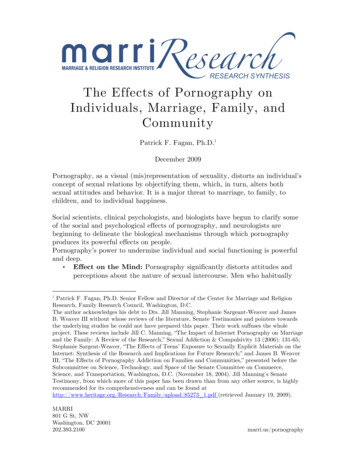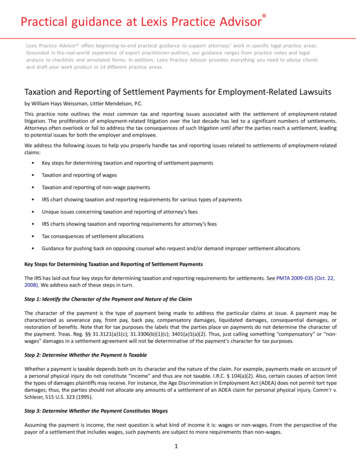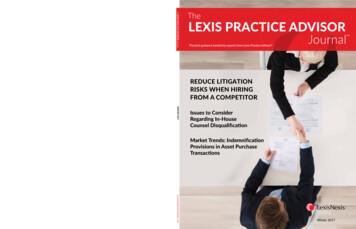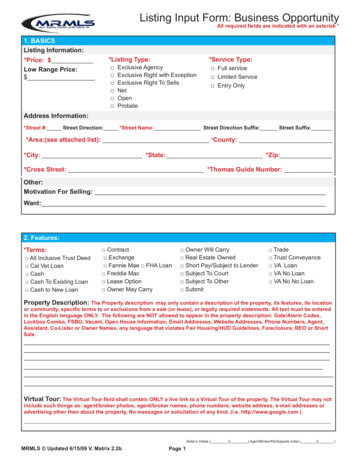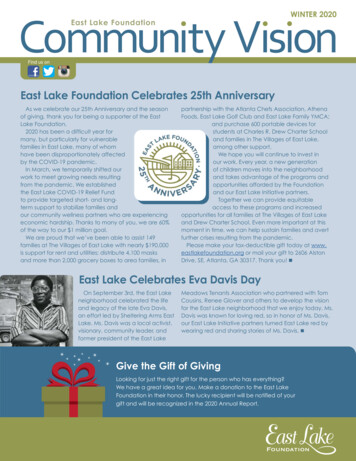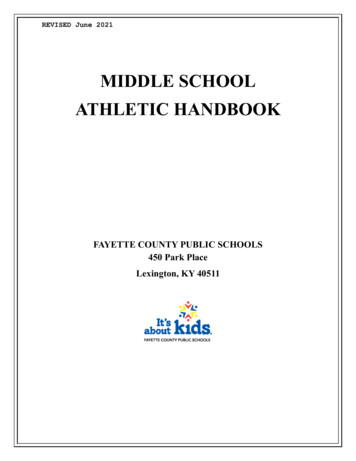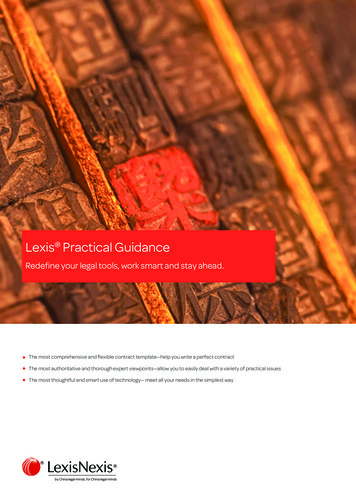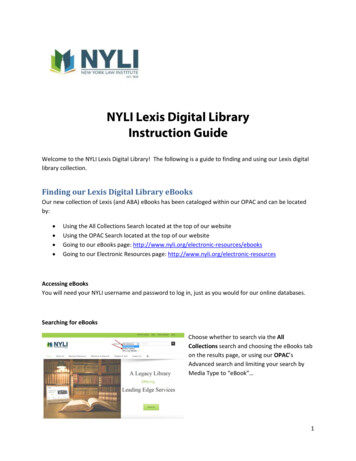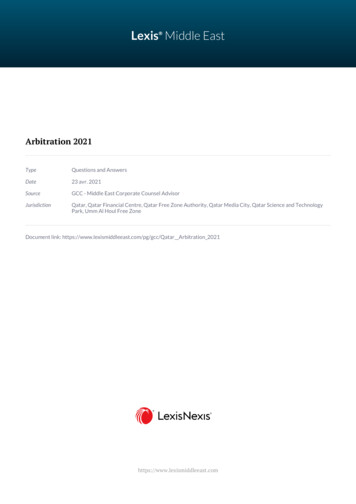
Transcription
Lexis Middle East Arbitration 2021TypeQuestions and AnswersDate23 avr. 2021SourceGCC - Middle East Corporate Counsel AdvisorJurisdictionQatar, Qatar Financial Centre, Qatar Free Zone Authority, Qatar Media City, Qatar Science and TechnologyPark, Umm Al Houl Free ZoneDocument link: https://www.lexismiddleeast.com/pg/gcc/Qatar Arbitration 2021https://www.lexismiddleeast.com
Arbitration 2021Table of contents1. Has the country signed up to any international treaties? . 42. How does the way arbitration works in your country differ from other international jurisdictions? . 43. What are the main Arbitration bodies in this jurisdiction - what laws/type of laws do they operate under? . 44. Do people in this jurisdiction generally use local arbitration bodies or bodies in other locations. If so which route is mostcommon - and does this vary with different types of transaction? . 45. How does recognition of foreign awards work in this jurisdiction? . 46. Is there a difference in the way foreign arbitration decisions and foreign court decisions are recognised? . 47. Are there specific situations where awards are not enforceable? . 48. Are there differences in freezones or secondary jurisdictions? . 59. Are there any types of dispute that cannot use arbitration as a vehicle? . 510. Are there any mandatory procedures that have to be followed? . 511. Are there specific features required in an arbitration agreement? . 512. Can third parties be bound by an arbitration agreement? . 613. Are arbitration decisions domestically binding? . 614. Who can act as an arbitrator? . 615. In what circumstances can an existing arbitrator lose their status? . 616. Do the arbitrators have any potential liabilities? . 617. How does the cost of arbitration vary with other jurisdictions? . 618. How does the cost of arbitration vary with the cost of litigation in this jurisdiction? . 619. Are any important specific time limits to be aware of in the arbitration procedure? . 620. How is the arbitration process started? . 721. Do parties have to be physically present? . 722. Are formal hearings normal? . 723. How do the evidential rules work in such cases? . 724. In what circumstances can an arbitration case be referred to national courts? . 725. Are interim measures possible? . 826. What majority is needed for a decision? . 827. What types of award are available? . 828. Is there a time limit for providing an award? . 829. What remedies do you have when awards are not forthcoming? . 830. What are the methods for challenging awards? . 831. Can interest be applied for delays - if so how? . 932. How are costs awarded? . 933. Is any preference given to parties who are nationals? . 934. Where a foreign court judgment has been provided - do the foreign or domestic statutes of limitation/time limits apply? Ifdomestic what are they? . 935. What is the domestic procedure for enforcing a foreign court judgment? . 936. Are there any basic requirements for enforcing a foreign court judgment? . 937. How does Islamic law impact the enforcement of foreign court judgments? . 1038. Will it be relevant to consider if the foreign court had personal jurisdiction over the parties? . 1039. Will the local party have to have been served with any specific notifications before the case for a foreign court judgment tobe enforceable? . 1040. Are judgments from some jurisdictions, e.g. other GCC states given greater deference - if so which ones and how? . 1041. Will domestic authorities ever only recognise part or limit awards? . 102https://www.lexismiddleeast.com
Arbitration 202142. Will damages in a foreign judgment need to be paid in local currency/using local interest rates? . 1043. If a foreign judgment is recognised how is it enforced? . 10Firm . 10Authors . 12https://www.lexismiddleeast.com3
Arbitration 20211. Has the country signed up to any international treaties?Qatar has signed up to the following international treaties:Convention on the Recognition and Enforcement of Foreign Arbitral Awards 1958 (New York Convention);Convention on the International Centre for Settlement of Investment Disputes 1966 (ICSID Convention);Convention on Judicial Cooperation between States of the Arab League 1983 (Riyadh Convention);GCC Convention for the Execution of Judgments, Delegations and Judicial Notifications 1996 (GCC Convention); andUnited Nations Convention on International Settlement Agreements Resulting from Mediation 2018 (SingaporeConvention).Additionally, Qatar is party to 55 bilateral treaties (23 of which are in force) and further 12 treaties with investment provisions(6 of which are in force).2. How does the way arbitration works in your country differ from other internationaljurisdictions?The Qatari Government issued the Law of Arbitration, Qatar Law No. 2/2017 (Arbitration Law), which regulates the ongoingand future arbitration disputes in Qatar. The Arbitration Law is based on the UNCITRAL Model Law on InternationalCommercial Arbitration and therefore the way arbitration works does not differ much from other jurisdictions.3. What are the main Arbitration bodies in this jurisdiction - what laws/type of laws do theyoperate under?The Qatar International Centre for Conciliation and Arbitration (QICCA) is the only permanent arbitration institution inQatar, administering arbitrations under (i) the QICCA Rules, which are based on / inspired by the UNCITRAL Arbitration Rules,and (ii) the UNCITRAL Arbitration Rules (or providing some administrative services). The QICCA also acts as appointingauthority under the UNCITRAL Arbitration Rules. The Qatar International Court and Dispute Resolution Centre ( QICDRC) andthe Chartered Institute of Arbitrators (CIArb), both based in the Qatar Financial Centre (QFC), also market arbitration as aform of dispute resolution pursuant to, respectively, the QFC Arbitration Regulations and the CIArb Arbitration Rules;however, neither of them formally administers arbitrations within Qatar itself.4. Do people in this jurisdiction generally use local arbitration bodies or bodies in otherlocations. If so which route is most common - and does this vary with different types oftransaction?Parties in Qatar most often choose arbitration under the International Chamber of Commerce ( ICC) Rules.5. How does recognition of foreign awards work in this jurisdiction?The Arbitration Law, alongside the New York Convention, provides for the procedural rules for recognition and enforcement ofarbitral awards in Qatar. Qatar is also party to the ICSID Convention, as well as 55 bilateral investment treaties (23 of whichare in force), and additional 12 treaties with investment provisions (6 of which are in force), in addition to the RiyadhConvention and the GCC Convention. Further, although it is not concerned with arbitration, Qatar is also a party to theSingapore Convention on Mediation, which may speak to Qatar's willingness to embrace the enforcement of foreign awards /decisions / settlements in Qatar. Depending on where the award is made, it may be recognized under a different internationaltreaty or the Arbitration Law. Having said that, given its geographical reach, most foreign awards are recognised and enforcedunder the New York Convention.An application for enforcement must be brought before the competent judge, accompanied by a copy of the arbitrationagreement, an original copy of the arbitral award or a signed copy thereof in the language of issuance and a certified Arabictranslation of the arbitral award, in case of a non-Arabic arbitral award.6. Is there a difference in the way foreign arbitration decisions and foreign court decisions arerecognised?For recognition of foreign arbitral awards, see question 5. For recognition of foreign court judgments, see questions 35 and 36.7. Are there specific situations where awards are not enforceable?The grounds for refusal ofenforcement under the Arbitration Law mirror those provided under ArticleV of the New YorkConvention. In addition to the grounds for refusal of enforcement which must be proven by the opposing party, the arbitralawards are unenforceable ab initio if the subject matter of the dispute cannot be settled by arbitration under the laws of Qataror recognition or enforcement violates the public order of Qatar.Enforcement of an award may be refused upon a request made by the party against whom the award is invoked, if it is broughtbefore the competent judge to whom the application of recognition or enforcement has been submitted, together with proof ofone of the following grounds:4https://www.lexismiddleeast.com
Arbitration 2021one party to the arbitration agreement, at the time of the conclusion of that agreement, was incompetent or undersome incapacity under the law, or the arbitration agreement is invalid under the law to which the parties have agreedto apply to the arbitration agreement or under the law of the country where the award was made, if the parties hadfailed to agree on that;the party against whom the enforcement is sought was not duly notified of the appointment of the arbitrator or of thearbitral proceedings, or was unable to present its defence for any reason beyond its control;the award has decided matters that fall outside the scope of the arbitration agreement, or in excess of the arbitrationagreement. However, if it is possible to separate parts of the awards relating to the arbitration from the parts notrelating to the arbitration, it is allowed to recognise or enforce the award deciding matters within the scope of thearbitration agreement or the matters that did not exceed the agreement;the composition of the arbitral tribunal, appointment of arbitrators, or the arbitral proceedings was in contradiction ofthe law or the agreement of the parties, or, in the absence of an agreement, was in contradiction of the law of thecountry where the arbitration took place; orthe arbitral award is no longer binding to the parties or has been set aside, or enforcement of the award has been stayedby a court of the country in which the award was issued or in accordance with the law thereof.8. Are there differences in freezones or secondary jurisdictions?There are differences in free zones and secondary jurisdictions in the State of Qatar. As of date, there are three free zones inQatar: the Qatar Science and Technology Park (“QSTP”), Ras Bufontas Free Zone, and Umm Al Houl Free Zone – the latter twobeing overseen by the Qatar Free Zones Authority.The Qatar Financial Centre is a secondary jurisdiction with a common law judicial structure and procedures. Under theArbitration Law, the Court of First Instance of the Civil and Commercial Court of the Qatar Financial Centre may be acompetent court to settle arbitration matters, subject to the agreement of the parties. Legal entities governed by the QFC areguided under the QFC regulations, although it is not strictly a free zone.9. Are there any types of dispute that cannot use arbitration as a vehicle?The Arbitration Law provides that in respect of administrative contracts, the approval of the Prime Minister (or the PrimeMinister's delegate) is required before the parties can agree to settle their disputes through arbitration.Furthermore, the Arbitration Law provides that arbitration is not permitted in matters in which conciliation is not permitted.10. Are there any mandatory procedures that have to be followed?There are various mandatory procedures stipulated under the Arbitration Law. The Arbitration Law allows parties to selectapplicable procedures in specific situations. The formal procedure requires that the award must be issued in writing and signedby the arbitrator or, if more than one arbitrator, by the majority of the arbitrators, unless agreed otherwise by the parties,provided that the reason for any omitted signatures is stated in the award. The number of arbitrators should be one or moreand if it is more than one, it should be an odd number.The award must state the reasons upon which the decision is based, unless the parties agree otherwise or if the applicable lawdoes not require it, or if the award is made upon the parties' settlement. It must also state the name of the parties and theiraddresses, nationalities, names, capacity of the arbitrators, a copy of the arbitration agreement, the date of issuance of theaward and the seat of arbitration. The award must state the costs and fees of the arbitration, the party responsible for payingcosts, and the procedures for payment, unless agreed otherwise by the parties.By law, all documents submitted to the court must be in Arabic or translated into Arabic by a translator licensed by the QatariMinistry of Commerce and Industry (MoCI). All documents translated into Arabic must be certified by licensed translators.There are no sworn translators in Qatar; however, there are translation companies licensed to operate by the MoCI.Practitioners in Qatar have had different views as to whether, with the enactment of the Arbitration Law, there is still arequirement for the Qatar-seated arbitral awards to be issued in the name of His Royal Highness, the Emir of the State ofQatar. Although there is no explicit legal requirement under the abolished arbitration law or any other law, or in theConstitution of Qatar (“Constitution”), there were several court decisions which ruled that Qatar-seated arbitral awards mustbe issued in the name of His Highness the Emir. Those judgments cited Article 69 of the Civil and Commercial Procedural Code(Law 13 of 1990) (“Procedural Code”) as creating the legal basis on which arbitral awards had to be issued in the name of HisHighness the Emir. Whilst the Arbitration Law repealed the articles in the Procedural Code dealing with arbitration (Articles190 - 210), the Arbitration Law did not repeal Article 69. With a judgment issued in July 2020, the Court of Appeal has clarifiedmuch of the previous uncertainty around this issue, by dismissing a challenge against an arbitral award that was not issued inthe name of His Highness the Emir.11. Are there specific features required in an arbitration agreement?An arbitration agreement is the agreement between the parties who have legal capacity to enter into such agreement. It maybe an independent agreement or may be in the form of an arbitration clause within an agreement. Under the Arbitration Law,Qatar Law No. 2/2017:https://www.lexismiddleeast.com5
Arbitration 2021the arbitration agreement must be in writing, otherwise it is invalid. The arbitration agreement is considered in writingif it is contained in a document signed by the parties, or it is in the form of paper or electronic correspondence, or byany other means of communication which allows for written proof of receipt.the arbitration agreement is considered to fulfil the requirement of being in writing if one of the parties claims thatsuch agreement exists in the statement of claim or the statement of defense, provided that the other party does notdeny such existence in its defence.a reference in a contract to a document that contains an arbitration clause is considered to be an arbitrationagreement, provided that the said reference clearly makes that clause part of the contract.12. Can third parties be bound by an arbitration agreement?Normally, third parties are not bound by arbitration agreements. But under the Arbitration Law, in case of death of a party, theagreement shall not expire and may be executed by or against persons representing the deceased party's estate. This is subjectto the agreement of the parties and without prejudice to the relevant legislative provisions excluding such rights. The authorsnote that this is an issue which is often addressed by the parties' adoption of institutional arbitration rules, which is somethingthat frequently happens in Qatar.13. Are arbitration decisions domestically binding?Unless they are set aside, arbitral awards rendered in Qatar are domestically binding.14. Who can act as an arbitrator?Under the Arbitration Law, an arbitrator can be any person who:(i) has full capacity;(ii) has not been convicted in a final judgment of felony or a misdemeanour involving moral turpitude or breach ofpublic trust, even if he has been rehabilitated; and(iii) is of good reputation and conduct.There is no condition that the arbitrator should be of any nationality unless the parties agree otherwise or the law requiresotherwise.The Arbitration Law provides that a register will be established at the Ministry of Justice to record arbitrators approved by adecision of the Minister. Minister of Justice shall issue decisions to determine the conditions and rules for registering andstriking off arbitrators in the aforementioned register. We are not aware of any such decision having been issued yet; however,we understand that the relevant department at the Ministry of Justice has been informally compiling names of arbitrators.15. In what circumstances can an existing arbitrator lose their status?Under the Arbitration Law, an arbitrator cannot be removed unless reasonable doubts arise as to their independence andimpartiality. Arbitrators may be replaced in case they lack the qualifications agreed upon by the parties. The request forreplacement shall be presented in writing to the arbitral tribunal, stating the underlying grounds and reasons. If the arbitratoragainst whom the challenge is brought fails to withdraw or if the other party objects to the challenge, the challenge shall bereferred to the authority designated by the parties in the arbitration agreement or the competent court, as applicable. Again, ifparties have adopted specific institutional arbitral rules, this issue will often be addressed in the relevant rules.The arbitrator may also be removed when he is unable to or fails to carry out his mandate, or drops out from participating inthe arbitration, leading to unjustified delay in arbitration proceedings, and yet fails to withdraw voluntarily and the twoparties do not agree to removal of the arbitrator. In such circumstances, the authority designated by the parties in thearbitration agreement or the competent court, as applicable, may decide to terminate the arbitrator's appointment upon therequest of either party.16. Do the arbitrators have any potential liabilities?Under the Arbitration Law, arbitrators shall not be held liable for exercising their tasks, unless they have done so in bad faith,collusion or gross negligence.17. How does the cost of arbitration vary with other jurisdictions?The cost of arbitration in Qatar is slightly cheaper than other jurisdictions, particularly when it comes to the cost of venuehire, where the QICDRC offer competitive deals for parties who wish to use their facilities and the QICCA allows parties to usetheir facilities free of charge.18. How does the cost of arbitration vary with the cost of litigation in this jurisdiction?The cost of arbitration is generally more expensive than the cost of litigation in Qatar.While local courts have the power to determine and allocate legal costs, they tend only to make nominal awards. Therefore,each party bears its own costs. With their discretion to allocated legal costs, arbitrators can and often do award costs to thewinning party.6https://www.lexismiddleeast.com
Arbitration 202119. Are any important specific time limits to be aware of in the arbitration procedure?There are certain time limits to be aware of in the arbitration procedure. Some of the important time limits are as follows:Unless otherwise agreed, if the parties fail to agree on one arbitrator or the two arbitrators fail to appoint the thirdwithin 30 days, any of the parties may ask the authority designated in the arbitration agreement or the competentcourt, as applicable, to appoint the arbitrator.Unless otherwise agreed, a demand to dismiss an arbitrator shall be submitted to the arbitral tribunal 15 days from thedate of the parties' knowledge of the formation of the arbitral tribunal.An arbitral award shall be issued within the timeline agreed upon or within one month from the date of the closinghearing. Unless otherwise agreed by the parties, such period may be extended for only another one month.An official copy of the arbitral award shall be served to each party within 15 days from the date of issuance of the award.An electronic copy of the arbitral award shall be served to the Ministry of Justice within 2 weeks from issuance.Unless otherwise agreed by the parties, each party can request the arbitral tribunal to correct or explain the arbitralaward within 7 days from the receipt of the award.The arbitral award may not be contested by any means of appeal except by annulment action within, unless otherwiseagreed by the parties, 30 days from the date of receipt of the date of issuance of the correction, explanation/interpretation or supplemental award.20. How is the arbitration process started?Under the Arbitration Law, arbitration proceedings commence on the day on which the respondent receives the request forreferral of the dispute to arbitration, unless the parties agreed otherwise - for example, by having agreed to a particular set ofinstitutional rules.21. Do parties have to be physically present?Under the Arbitration Law, each party to the dispute may authorise one or more attorneys to represent them, and may engageexperts or translators. The arbitral tribunal may, at any time, require any party to submit proof of capacity granted to the legalrepresentative in accordance with the form required by law or defined by the arbitral tribunal.22. Are formal hearings normal?The Arbitration Law provides that the arbitral tribunal shall hold hearing sessions to enable the parties to explain the subjectof the case and to present their arguments and evidence or to hear their statements, unless the arbitral tribunal deems itsufficient to submit the written memorandums and documents or the parties agree otherwise.The tribunal shall give the parties advance notice of the timings of pleading sessions or hearing of statements, inspections,and examination of documents that are set by the arbitral tribunal, unless the parties have agreed on a specific date and timefor such notification.In our experience, “document only” arbitrations are rare in Qatar, and it is therefore normal to have a formal hearing.23. How do the evidential rules work in such cases?The parties can agree on certain arbitration procedures, including evidence rules, which must be followed by the arbitraltribunal. It is possible to seek assistance from the competent court to obtain evidence. In accordance with the relevantprovisions, the tribunal shall hear witnesses and experts without taking an oath. Copies of memoranda, documents or otherpapers filed by one party and copies of expert reports and other evidence are sent to the other party.Moreover, the tribunal or any of the parties may, after approval of the arbitral tribunal, seek assistance from the competentcourt to get the evidence including the technical expert's work and examination of evidence. If the arbitral tribunal finds thatthe requested assistance is necessary to adjudicate the subject of the dispute, the tribunal may suspend the arbitrationprocedures till this aid is obtained. This shall result in suspension of the time scheduled for rendering the arbitral award.The competent court may accept the request for assistance within its authority in accordance with the applicable rules forcollecting evidence, including judicial summoning or sentencing for the non-appearance or non-response of witnesses toadequate penalties set forth in Articles 278 and 279 of the Procedural Code.24. In what circumstances can an arbitration case be referred to national courts?Provided parties have first complied with the procedures laid down in any institutional rules which may have been agreed and which may be determinative of the issue in question - an arbitration case can usually be referred to national courts insituations where:an arbitral tribunal with one arbitrator and the parties fail to agree on the second arbitrator within 30 days from thedate of the notice of dispute to the respondent party;a three-person arbitral tribunal and the arbitrators appointed by the parties fail to appoint the third arbitrator within30 days from the later dates of their appointment;there is a challenge to the arbitrators' nomination or appointment;there is termination of an arbitrators' appointment, as a result of their failure to carry out their mandate or resign theirhttps://www.lexismiddleeast.com7
Arbitration 2021there is termination of an arbitrators' appointment, as a result of their failure to carry out their mandate or resign theirappointment;to appeal the arbitral tribunal's decision on dismissing the challenges to the tribunal's jurisdiction, within 30 days fromnotification of the dismissal;to seek assistance in obtaining evidence;to challenge the arbitral award by annulment action;to appeal a ruling ordering enforcement or determining non-enforcement of an arbitral award; andto seek interim or precautionary measures where the tribunal does not have jurisdiction or is incapable to acteffectively at the time.25. Are interim measures possible?In situations where the arbitral tribunal, or any other person to whom the parties have granted certain authority, does nothave jurisdiction, or is incapable to act effectively at the time, the
Lexis Middle East https://www.lexismiddleeast.com Arbitration 2021 Type Questions and Answers Date 23 avr. 2021 Source GCC - Middle East Corporate Counsel Advisor Jurisdiction Qatar, Qatar Financial Centre, Qatar Free Zone Authority, Qatar Media City, Qatar Science and Technology Park, Umm Al Houl Free Zone

